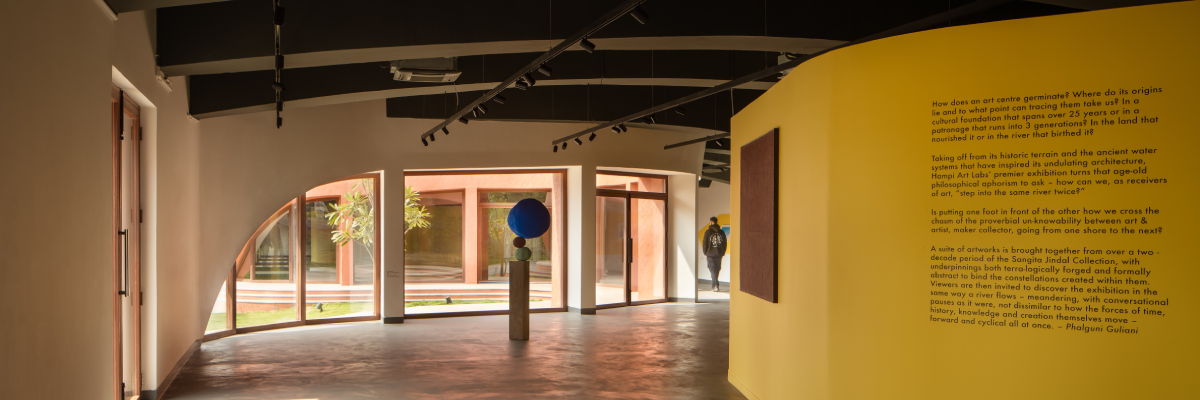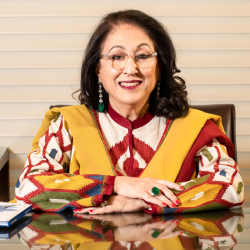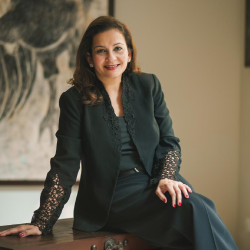November 15 , 2024
12:00 PM - 01:00 PM
Birla Opus Auditorium (On Site) at ART MUMBAI 2024

This panel will delve into why major institutions in South Asia are being funded by private individuals. Audiences will understand how and why these institutions are able to fill the void within the arts and culture space that state funded bodies are unable to as well as speak to the responsibility privately run organisations feel towards creating spaces of public engagement and commune.

Kiran Nadar has made a major contribution to shaping and inspiring the Indian art world, and has become a pivotal figure in the country's cultural landscape, with an influential vision that has increased the visibility of Indian modern and contemporary art worldwide. Her collection of over 15,000 artworks representative of all major phases of modern and contemporary Indian art are showcased in KNMA, India’s first private art museum established by Kiran Nadar in 2010, as an exhibition platform for new art forms, ensuring art’s accessibility to people, and driving dynamic outreach to nurture a museum-going culture among Indian youth. KNMA is set to open in a new state-of-the-art building near Delhi's Indira Gandhi International Airport. Covering 100,000 square meters, it will be a global cultural hub for visual arts, music, dance, and theater. The new space will feature changing exhibitions, permanent displays, and performances, making it a versatile space for artistic expression. With its strategic location on National Highway (NH8), KNMA aims to become an international cultural destination accessible to a diverse audience. Kiran has forged stellar collaborations with globally renowned museums including the Museo Nacional Centro de Arte Reina Sofía (Madrid), The Metropolitan Museum of Art (New York), Tate Modern (London), Musée Des Arts Asiatiques, (Nice), Sharjah Art Foundation (Sharjah), Barbican (London) and Musée Guimet (Paris) in a short span. She has been instrumental in helping set up the Shiv Nadar Foundation which has invested US$ 1.5 billion to create institutions of transformational education, nurturing India’s next-generation of leaders.

Sangita Jindal is the Chairperson of JSW Foundation. Under her leadership and direction, JSW Foundation, the social development arm of the JSW Group (one of India’s leading conglomerates) has an established track record and a legacy of enabling holistic change across communities around India. A visionary who believes in the transformative power of art, Sangita set up the Jindal Arts Creative Interaction Centre (JACIC) at the National Centre for the Performing Arts (NCPA) in 1994. She also publishes Art India Magazine, which has been a chronicler of the Indian art scene since 1996. Her efforts to preserve heritage for future generations led to extensive restoration work at the Hampi temple complex in the southern Indian state of Karnataka, and the Keneseth Eliyahoo Synagogue and iconic David Sassoon Library and Reading Room in Mumbai, Maharashtra. The projects received conservation awards and an award of merit respectively from UNESCO. She has recently undertaken the restoration of the Shalimar Bagh - the world-renowned Mughal Garden in Srinagar, Kashmir. Sangita founded Hampi Art Labs, an art residency and exhibition space aimed at nurturing artists globally. She encourages and invests in art as a practice. She supports the AD x JSW Prize for Contemporary Craftsmanship and is supporting the next edition of The Indian Ceramics Triennale. Sangita is an Eisenhower Fellow, serving on the Board of Trustees of the World Monuments Fund - India Chapter and as an Advisor on the Khoj Board. She is a member of the Tate International Council, the UN Women Business Sector Advisory Council (BSAC), a governing board member of Mumbai First and a global trustee of Asia Society. She has also been elected as Chairperson of the Asia Society India Centre in 2024. Sangita was recognized by Vogue India as ‘Heritage Keeper of the Year’ in 2019 in their Women of the Year awards in recognition of her work preserving cultural heritage in India. She also received the Golden Peacock Award for Social and Cultural Leadership 2019.

Rajeeb Samdani is the Co-Founder and Trustee of the Samdani Art Foundation. Together with his wife Nadia Samdani MBE, he established the Samdani Art Foundation, the biannual Dhaka Art Summit, and Srihatta- Samdani Art Centre and Sculpture Park in order to promote Bangladesh and South Asia’s contemporary artists and architects. He is a member of the Tate International Council Board, a founding member and Co-Chair of Tate’s South Asian Acquisitions Committee, a member of Tate’s International Council, Alserkal Avenue’s Programming Committee, Delfina Foundation’s Global Council, Art Basel's Global Patrons Council and a founding member of The Harvard University Lakshmi Mittal South Asia Institute’s Arts Advisory Council. In 2017, with his wife Nadia, he was the first South Asian arts patron to receive the prestigious Montblanc de la Culture Arts Patronage Award.

Minal Vazirani founded Saffronart in 2000 and has been instrumental in growing its operations from startup to its current position. She has provided leadership in every area of the company, ranging from strategy and business development to technology and finance. She was instrumental in establishing and expanding Saffronart's presence in Mumbai, New York and London, and has driven the company's foray into new businesses, including jewellery, textiles and other collectibles. In addition, Minal has curated, planned and organised exhibitions of Indian art in India and internationally. Sh is also one of four co-founders of ART MUMBAI. ART MUMBAI is a meticulously curated array of modern and contemporary art from both India and South Asia as well as a robust roster of galleries and participation from foundations and distinguished art institutions. Minal is a regular panellist and guest speaker at Indian contemporary art events as an industry expert, and has served several industry organisations. She has been on the board of advisors to the Friends of Sir JJ School of Art Trust and Time Out magazine India, and has co-chaired the FICCI committee on Arts and Business. Minal has been featured in Art + Auction magazine's global power issue, and been a fellow of the Inaugural Class of Ananta Aspen’s Kamalnayan Bajaj Fellowship and a member of Aspen Global Leadership Network fellow at the Aspen Institute's India leadership programme. She was also invited to contribute to the 2009 Art Asia Pacific Almanac to represent the trajectory of Indian art over the year. In 2005, Minal led a review of Saffronart’s business when the Harvard Business School published a case study on the company. It continues to be studied by MBA students across business schools. Minal is also a co-founder of the Saffronart Foundation, using art as an enabler to raise awareness about various social issues and movements. Since its establishment, the foundation has funded initiatives rooted in the arts to support a range of efforts – education and food sustenance for children in community education centres in a Mumbai slum; food, medicines, and clothing for those in need during natural disasters across India; and educational programmes in marginalised communities. In addition, she chairs the advisory board for the St+ART MUMBAI Urban Art Festival (MUAF) as well as the India Committee for Women to Watch 2024, an exhibition developed by the National Museum of Women in the Arts, Washington D.C. Minal also sits on the advisory board for Aangan Trust, a child protection NGO that enables safe communities for children in hotspots for child harm across India. Prior to founding Saffronart, Minal was a management consultant with Booz, Allen & Hamilton in Mumbai where she worked across several industries in the US, South East Asia and India. Minal received her MBA from INSEAD in France, where she received the Sasakawa Fellowship, and a BS in Chemical Engineering and Bioengineering with a minor in Art History and Indian History from the University of California, Los Angeles. Minal has been an active collector of Indian art over the last twenty seven years.